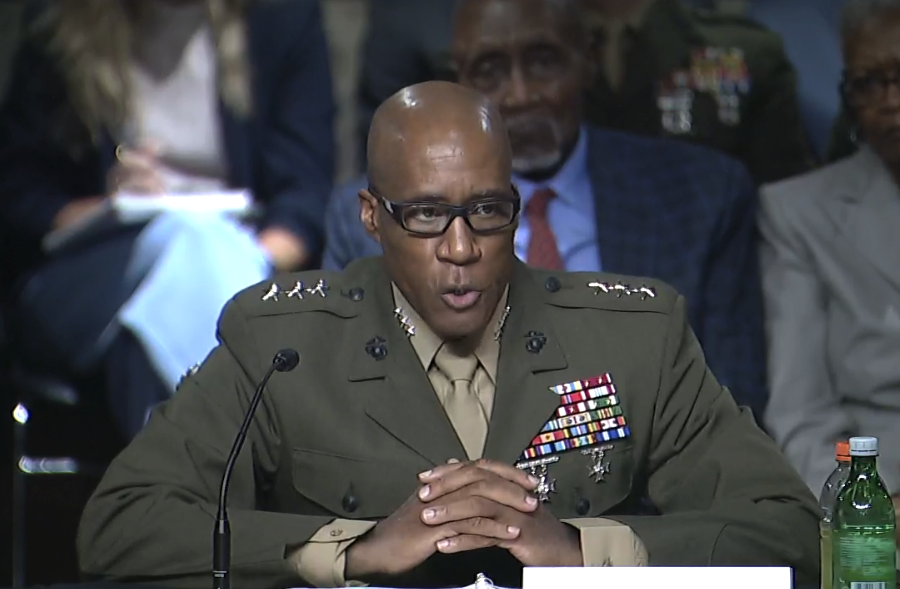Nominees to lead U.S. Africa Command and U.S. Special Operations Command who testified before the Senate Armed Services Committee on July 21 described the Air Force assets they would need to better fight terrorism and counter influence by China and Russia.
Army Lt. Gen. Bryan P. Fenton is nominated to receive his fourth star and head SOCOM, replacing Army Gen. Richard D. Clark; and Marine Corps Lt. Gen. Michael E. Langley, the son of retired Air Force Master Sgt. Willie C. Langley, is nominated to receive his fourth star and head AFRICOM. Langley would be the first African-American four-star Marine and the first to lead the African combatant command (COCOM), replacing Army Gen. Stephen J. Townsend.
Both nominees cited the growing threat of terrorism in Africa and the importance of air support to prevent a threat to the U.S. homeland.
“I will need, as Gen. Townsend has, more ISR,” Langley said in response to a question from Sen. Joni Ernst, R-Iowa, about the growing threat of Al Shabaab in Somalia and the Horn of Africa.
“ISR is an active deterrent. ISR is the commander’s sense to make sense, and it underpins all activities,” he explained. “Al Shabaab has increased capacity, and that really is the first ranking as far as affecting U.S. interests and U.S. people. So, they have aspirations for external operations, transnational operations.”

Langley also said terrorist groups ISIS, al-Qaida, and JNIM are spreading across the Sahel, the Lake Chad Basin, and into West Africa, leading to instability that is further fueled by Russian mercenaries.
Confronting the threat will require a diplomat-like engagement with African countries and new partnerships, he said, responding to a question by SASC chairman Sen. Jack Reed (D-R.I.), who noted China’s aggressive moves to secure a naval port in the Gulf of Guinea.
“Working with other countries, I think we set the bar,” said Langley, who led Marine forces in Europe and Africa. “That’s going to be the biggest deterrent or assurance actions, as I mentioned, that’s going to deter China from trying to take over the west coast of the African continent.”
In Somalia, where Langley deployed in support of operation Restore Hope, he said the void created by the withdrawal of American troops in January 2021 could lead terrorist groups and America’s adversaries to move in. He cited how Russia’s mercenary Wagner Group filled a similar gap in Mali.
SASC ranking member Sen. Jim Inhofe (R-Okla.), who retires at the end of his term, warned committee members of rumors that Defense Secretary Lloyd J. Austin III plans to cut funding to AFRICOM and collapse the European and African special operations forces into one unit.
“I’ve heard from four different sources unrelated that these plans to downgrade are out there,” Inhofe said. “Given the growing strategy and strategic importance of Africa to the national security, this would be short sighted and would make implementing the NDS in Africa much harder.”
In contrast to rumored funding cuts to DOD’s Africa interests, much focus was given to how Fenton planned to strengthen special operations capacity in the Indo-Pacific as a deterrent to China.
“I would start with, the role is, in concert with the COCOMs, developing asymmetric, scalable options for the COCOMs via our special operators’ placement, access, and influence, presenting multiple dilemmas to the Chinese, in this case, and INDOPACOM, and also developing and strengthening the partner and ally piece that’s a comparative and competitive advantage for this nation,” he said.
Sen. Tom Cotton (R-Ark.) asked Fenton to describe what such partner building would look like.
“They would look like small teams in countries throughout the region,” said Fenton, who served as commander of Special Operations Command Pacific and deputy commander of U.S. Indo-Pacific Command.
Fenton said the teams would speak the language; be culturally attuned; have served in the region for years; develop, implement, train, advise, and assist plans; and present options both to the country and to the INDOPACOM commander.
The SOCOM nominee agreed with prior high-level defense assessments that China is preparing the capabilities for a Taiwan invasion “in this decade.”
Asked what lessons he drew from the Ukraine conflict, Fenton pointed to the early investment in Ukraine’s special operation forces, space-based data collection, and unmanned aerial systems (UAS).
“The use of open-source satellite imagery and modern technology, small UASs, is blunting and has denied Putin, in many ways, his desired objectives,” Fenton said.
The 30-year special operator was also asked what future investments he hoped to make to strengthen the command.
“I would start with capabilities that will enable us and advantage us in contested environments,” he said. “They may look like manned and unmanned systems, artificial intelligence, and certainly leveraging technology to give us an advantage.”


